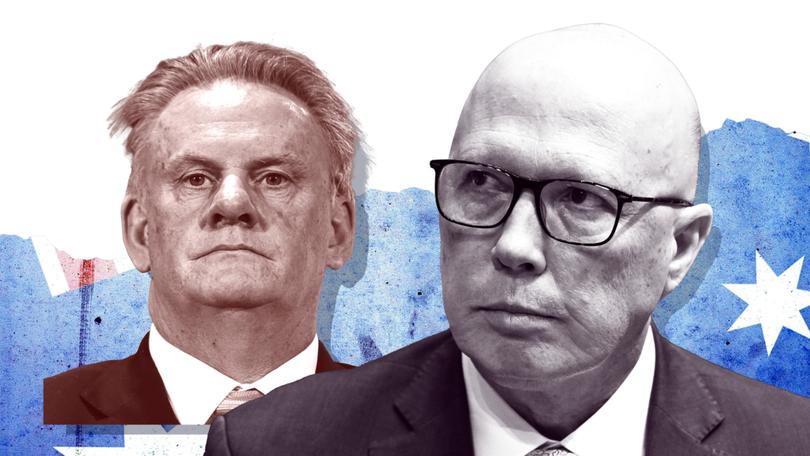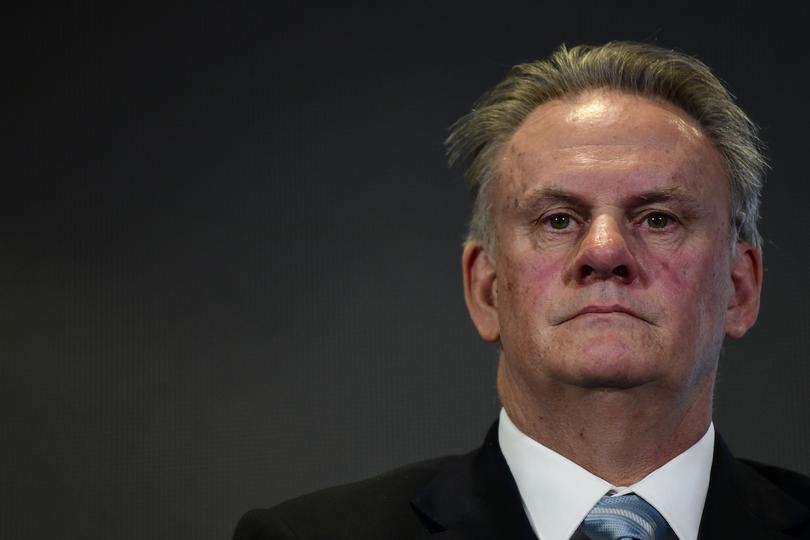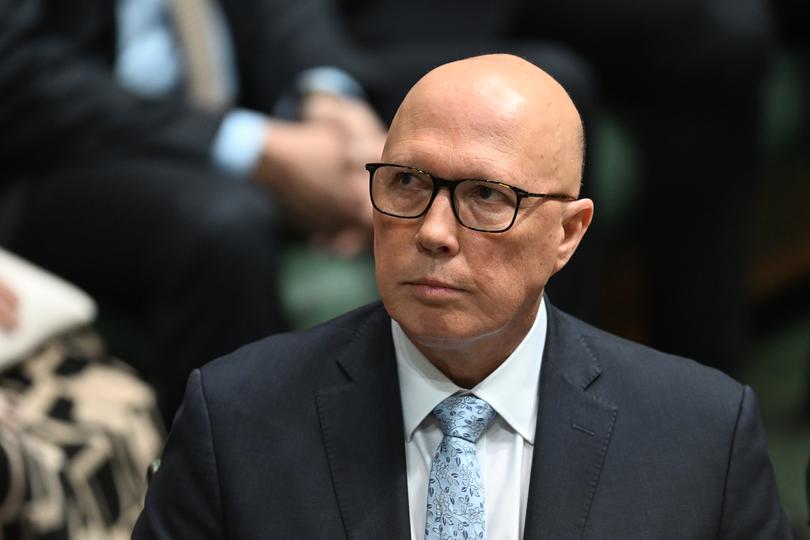Sorry Jim Chalmers, if you want to namecheck the most divisive leader in recent memory, look closer to home

Is Jim Chalmers suffering from short-term memory loss?
On Monday, the would-be Labor leader told a friendly audience at the left-wing John Curtin Research Centre that Peter Dutton was the “most divisive leader of a major political party in Australia’s modern history.”
Chalmers complained the Liberal Party leader, “divides deliberately, almost pathologically” and that it is “worse than disappointing” but “dangerous.”
Sign up to The Nightly's newsletters.
Get the first look at the digital newspaper, curated daily stories and breaking headlines delivered to your inbox.
By continuing you agree to our Terms and Privacy Policy.He sounded hysterical.
It is to Labor’s continued frustration that Dutton has not turned out to be the right-wing bogeyman they hoped and so now they are obsessed with recasting the opposition leader to fit their fantasy of an Australian Trump.
The way this Government obsesses over an opposition leader could solve the housing crisis, given how much time Dutton spends occupying the Government’s mind, rent-free.
But Chalmers’ claim is also deceitful, particularly from someone who is more qualified than most to identify who truly owns the title of being the country’s most divisive leader in living memory.
Because in anyone’s book, the period between December 2003 to January 2005 certainly constitutes “Australia’s modern history” and, unless Chalmers is pre-emptively relegating the Labor party to a minor party status, it is a fact that his side of politics constitutes a “major political party.”
So we must assume the Federal Treasurer has forgotten how to calculate because the above all adds up to a different man retaining the title of the most divisive political leader in recent memory - Labor’s Mark Latham.

During that period, Chalmers had a clearer insight than the rest about the destructiveness of Latham’s personality flaws and complete unsuitability to run the country – he was the Australian Labor Party’s national research manager at the time.
In fact, in Latham’s subsequent dirt-dishing memoir The Latham Diaries, the former opposition leader mentions Chalmers twice.
Once about Kevin Rudd badgering Chalmers for polling to leak.
The second in relation to Tim Gartrell, the then-national secretary of the ALP and now Prime Minister Anthony Albanese’s chief of staff, leaving Chalmers to run the focus groups where voters made clear their views of the then-Member for Werriwa.
So if anyone should be able to recall with crystal-clear accuracy what it felt like to live under a truly divisive opposition leader it should be Chalmers.
Like the time when Latham - a self-declared “hater” - called former Prime Minister John Howard an “arselicker” and the Cabinet a “conga line of suckholes.”
Truly the language of a leader out to “heal divisions” that Chalmers said was the job of politicians in his speech last night.
Chalmers should also be able to remember Latham’s political incompetence, such as the proposed unfunded mega-spending scheme Medicare Gold and his vote-losing loutish behaviour that culminated with his overly aggressive handshake with Mr Howard.
Latham would have done deep and lasting damage to Australia’s national security had he unleashed his anti-Americanism in government.
So disastrous was Latham’s short term as Labor leader that he became only the second person to hold the position without ever having an office in Parliament’s ministerial wing.
Latham quit, turned to One Nation and now fashions himself as an outsider of politics as he collects yet another pay cheque from taxpayers, this time the people of New South Wales, where he is a Member of the State’s Upper House until 2031.
He was a catastrophe that Labor would love to expunge from the party’s history and why Chalmers’ attack on Dutton is ludicrous.
Dutton has his faults, he is unimaginative as a leader, holds fewer press conferences - which would expose him to scrutiny - than he should, and like Julia Gillard, struggles to show publicly the warmth his colleagues observe privately.
But he is in no way comparable to the noxious, negative and ultimately calamitous force that was Latham.
Nevertheless, Dutton should sit back and welcome the attack.
By accusing him of stirring culture wars by querying the security checks conducted on those coming to Australia from Gaza, Labor only risks reinforcing Dutton’s everyday touch.
“Every question in Question Time last week was about the Middle East, and not one about middle Australia,” Chalmers grumbled.
“He wants to start a culture war because he has no idea how to finish the fight against inflation.
“He picks fights and stokes division on national security because he’s got no idea about economics.”
It is completely reasonable and within the expectations of mainstream Australia to ask what security checks are being carried out on people arriving from a war zone that is operated and run by Hamas, a designated terrorist group.
That same terrorist organisation is known for its deliberate tactic of infiltrating civilian infrastructure to conceal and carry out its attacks.

The danger for Chalmers and Labor is that by declaring Dutton to be stoking a culture war, they once again risk telling ordinary voters that the government doesn’t recognise their concerns as valid.
There is no better example of this than the Voice. Labor continually demonised Dutton for opposing the referendum proposal, but in the end, the majority of voters in every single state, including progressive Victoria, either agreed or were persuaded to his view.
The act of taking Australia’s most handle-with-care political issue and foisting it onto voters without the necessary truth-telling and campaign effort was destructive. It set back Indigenous recognition for generations and created an unnecessary fault line between Australians that did not previously exist.
That recklessness should haunt Albanese’s legacy.
It is telling that Chalmers did not once acknowledge the division and damage caused by holding that ill-prepared referendum.
Chalmers clearly wants to drag Dutton into a fight on economics. Fair enough, the next election will be overwhelmingly fought on cost-of-living.
But Chalmers should be careful what he wishes for.
Because a fight on the economy will ultimately boil down to the Treasurer having to explain to Australians why it is that under his management, inflation is increasing and not falling like it is elsewhere.
In the United States, inflation has fallen to 2.9 per cent and the Federal Reserve chair Jerome Powell has declared that “the time has come for policy to adjust.”
“The direction of travel is clear, and the timing and pace of rate cuts will depend on incoming data, the evolving outlook, and the balance of risks,” he said last week.
In short, Americans can expect a rate cut very soon. This is also the situation in the United Kingdom where inflation has fallen to within the Bank of England’s target and interest rate relief has already begun.
The same cannot be said for Australia. The RBA Board said after its most recent meeting that “the risk of inflation not returning to target within a reasonable timeframe had increased.”
At that gathering the board was choosing between leaving the cash rate steady at 4.35 per cent or raising it and said it was “unlikely that the cash rate target would be reduced in the short term,” i.e. before the election when Chalmers and Albanese face voters seeking a second term.
So it’s easy to see why the Treasurer would prefer to start a fight over an imaginary despot in Dutton.
But he should remember that voters have a longer memory than he currently demonstrates and histrionic attacks on his opponent won’t make the next grocery shop any cheaper.

